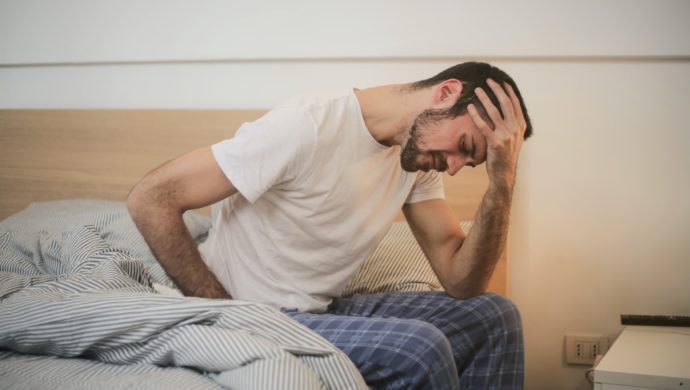Individuals who experience severe recurrent headache pain that wakes them from sleep are said to suffer from what the International Classification of Headache Disorders (ICHD) calls hypnic headaches. Commonly referred to as “alarm clock headaches” due to their specific periodicity, these headache attacks most often manifest themselves a couple of hours prior to a person’s usual wake-up time.
While relatively little information is known about hypnic headaches, it is thought that they are symptomatic of irregularities in hypothalamus function or transient ischemic attacks. This would explain the connection of the headaches to sleep patterns, as the hypothalamus is directly involved in regulating certain phases of our natural cycles.
Happening as frequently as several times a night and usually in those over 60, hypnic headaches can be extremely troubling and disruptive to a person’s daily life if not treated with preventative therapies and medications.
What Are the Symptoms of Hypnic Headache?
While the causes for a hypnic headache are still elusive to researchers, the symptoms are not. Hypnic headache symptoms include but are not limited to:
- A severe and sudden onset of pain at the base of the skull
- Drooping eyelids
- Sinusitis (blocked nose)
- Teary eyes
- Cephalalgia headache pain extending to the face and neck
Furthermore, migraine aura symptoms such as nausea, vomiting, phonophobia, and photophobia can accompany a hypnic headache. These symptoms can last for as little as 20 minutes and as long as several hours after waking. The frequency of experiencing hypnic headaches throughout an evening can be up to 10 times, depending on the severity of the case.
Diagnosing Hypnic Headache
A neurology specialist will need to take your history and perform a thorough physical exam to diagnose hypnic headaches properly. The typical approach for diagnosing this condition is by ruling out other regular forms or types of headaches that you may be experiencing before attributing them to a hypnic headache.
Often, people think that they have hypnic headaches when really they are experiencing autonomic symptoms as a result of:
- Cluster headaches
- Migraine headaches
- Temporal arteritis
- Transient ischemic attacks (high blood pressure)
- Hypertension
- Tension headaches
- Sleep apnea
- Other types of sleep disorders
So remember, you should only be diagnosed with a hypnic headache once these have been ruled out.
Because there is no one specific test or procedure for diagnosing this condition, the diagnosis of hypnic headaches is made primarily on past experiences and self-reported symptoms. In some case reports, the use of polysomnography has been effective at diagnosing the pathophysiology of hypnic headaches.
In addition, image scans such as MRI and CT scans may be used in cases where the physician suspects other underlying conditions such as brain tumors or lesions, clotting, or a life-threatening injury.
Hypnic Headache Treatment Options
Treating a hypnic headache is much simpler than diagnosing one, especially if you have been experiencing them for some time. The primary forms of preventive treatment used to avoid hypnic headaches generally include a mix of the following recommendations.
Adjusting sleep and wake schedules
Try and adjust your sleep and wake schedule to be six hours apart from the time you usually experience a hypnic headache each day. This may mean that you need to go to bed earlier or get up later, but it will help reduce the frequency of this type of headache.
Prescription & OTC Medications
As hypnic headaches may be a result of irregularities in hypothalamus function, healthcare professionals may recommend or prescribe medications to remedy this issue, including:
- Anti-inflammatories such as ibuprofen and acetaminophen
- CBD oil supplements – such as the products from Blessed CBD
- NSAIDs such as indomethacin
- Antidepressants such as lithium carbonate
- Calcium channel blockers such as flunarizine
- Anti-seizure medications containing topiramate
These medications have been proven to be effective treatments that reduce and even eliminate the frequency of hypnic headaches. However, be aware that medication overuse may result in additional health issues, so it is important that you keep track of your daily dosage.
Natural Supplements & Alternative Therapies
For those worried about the side effects of prescription and over-the-counter medications, several natural preventative therapies and treatments can also be used to successfully relieve the symptoms of hypnic headaches without the use of pharmaceutical drugs. These include:
- Natural sleep aids such as melatonin and valerian root
- Caffeine from a cup of coffee (ingested before bed)
- Physical exercise
- Stress-reducing activities such as meditation and yoga
Patients who meet the diagnostic criteria for hypnic headaches but do not wish to undergo medical treatment often use these alternative therapies. However, keep in mind that boosting melatonin production or performing calming exercises to induce better REM sleep (rapid eye movement) may likely not alleviate the symptoms of this type of headache entirely. Therefore, it is always advisable to talk with a healthcare professional before initiating any self-administered therapy or treatment plan.
Help for Hypnic Headaches
Individuals who think they might be suffering from hypnic headaches or have been diagnosed by a professional healthcare provider as having these types of headaches may want to consider additional learning resources that are available online, including:
- The Mayo Clinic
- International Headache Society
- American Migraine Foundation
- PubMed
These organizations are dedicated to helping individuals suffering from hypnic headache syndrome and other severe headache disorders receive the help they need for head pain management.




